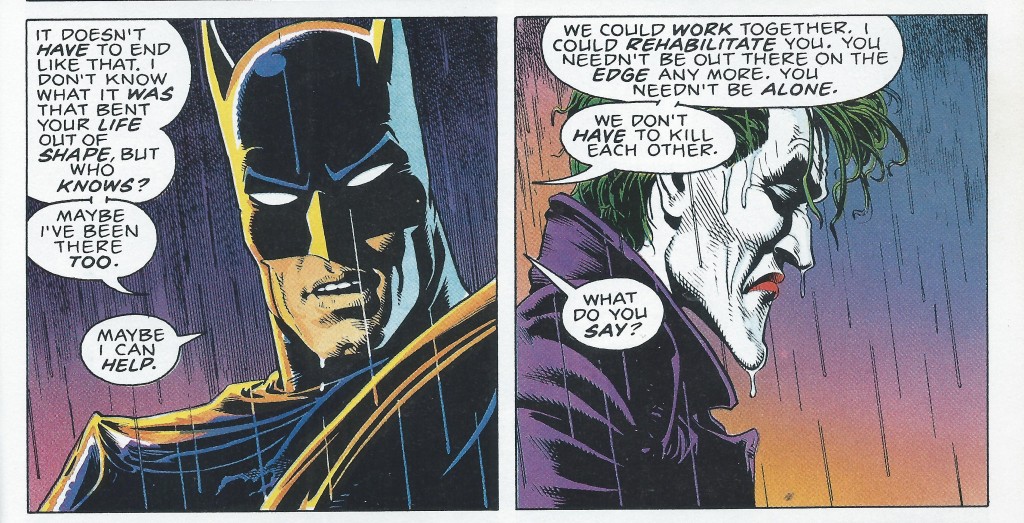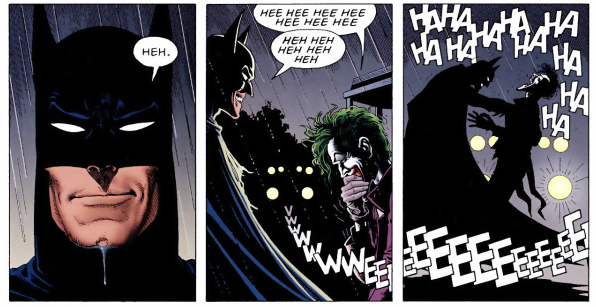Alfred Hitchcock believed that once a film had been storyboarded, it was complete. The actual filming of it was simply an afterthought. It’s a visual medium after all. The script lays the story out, the visuals bring it to life. Why would I even bring that up? Because Batman: The Killing Joke is a film. The fact that it hasn’t been filmed is simply an afterthought. This is one of the most purely cinematic graphic novels ever written. Alan Moore is notorious for describing every minute detail in his scripts, but if anything can attest to how that pays off, The Killing Joke is it.
But more than anything else, The Killing Joke is about the characters. All great stories are. This is the ultimate Batman vs. Joker story, whether you read it as the final one or not. It’s devoted entirely to the relationship between these two characters. Batman goes to Arkham in the opening just to talk. He knows their predestined outcome and he’s looking for any way out. He just wants hope that maybe there’s an end to this where they don’t have to kill each other. This fear hangs over the whole book.
What we have here, by and large, is a character piece on the Joker: something easier said than done. But a true character study of the Joker has to be a character study of Batman as well. Most people cite Joker as the perfect villain because he’s the opposite of Batman, but he’s not. If anything, he parallels and even complements Batman incredibly well. He even points it out in the text. Both of them are just two people who had one very bad day to turn them into what they are. That’s what terrifies Batman when it comes to the Joker. This is the person he could have become. Even worse, there’s a fear that this is who he still may become someday. If he just gives in.
As for the Joker, this is a person with no sense of self from one moment to the next. They have no reflection in the mirror, not really, and that is why they so desperately need to be a reflection of Batman himself. So many writers over time have treated the Joker as a sort of anti-character. Alan Moore does the unthinkable in The Killing Joke: he humanizes the clown. This Joker is terrifying because he’s not a monster, which is something that very few writers have been bold enough to try since. This is a man who has become completely lost inside himself, not unlike Batman.
Yet in this book the Joker does some of the most horrific, unforgivable things he has ever done. The crippling of Barbara Gordon is one of the most infamous sequences in comic book history. It’s terrifying. Not just in the act, but in the sheer glee that the Joker takes in it. I will admit, though, that I think the pictures go a bit too far. Even Alan Moore has said as much. The Joker is not a sexual entity, he’s never really worked when he’s been characterized as such. Sure, he will use others’ fear of sexuality, their own disgust at certain aspects of the sexual spectrum or even themselves. That’s basically what the Joker is doing here. The pictures of Barbara aren’t taken for his own pleasure but for the look on Gordon’s face when he sees them. That’s the true pleasure the Joker takes from something like that. The home invasion and the crippling of Barbara is enough that the book would easily have worked without it.
The story is also told concurrently with flashbacks to the Joker’s own origin. This was sacred ground. The Joker isn’t supposed to have an origin, that’s part of his gimmick. While he admits it may not have played out exactly like he’s recalling, I think for the purposes of this book on its own, this is a pretty solid account of how he came to be. The flashbacks, I think, make the book especially appealing to new readers. After all, how many current TV shows make use of this very format? It’s one more way in which The Killing Joke was ahead of its time.
The ending of the book is a subject of much debate among fans. It’s worth looking at, especially when analyzing these two characters and their relationship. Some people believe that Batman kills the Joker at the end, thus cementing the importance of the title. Others—including those who worked on the book—insist this is not the case. The last panels, I believe, are purposefully vague. Is Batman snapping the Joker’s neck or is he leaning on him for support before knocking him out?
I see the ending as a sort of Rorschach test for the reader. What’s there isn’t as important as what you see, what you think is there. The ending works no matter how you read it. It’s poignant either way. If Batman does kill the Joker, then he finds himself exactly where he was afraid to find himself at the beginning of the book. If he doesn’t kill the Joker, then it becomes a beautiful quiet moment between hero and villain. The Joker’s just done some of the worst things he’s ever done. There’s an inherent sympathy from Batman because he’s had that moment. The one that more or less drove him insane, the moment that either created his rogues or let out what was already there.
This is the Batman that was perfectly embodied in the animated series, but that we rarely see elsewhere: the Batman who takes these quiet moments with his antagonists. Who listens to them and, even if he doesn’t want to, understands them. He still takes him down. He still hates the Joker. Yet they have a closeness that one of them doesn’t want to admit. They know they’re going to kill each other. They know they’re doomed and they know that, in the long run, there’s no hope for either of them.
To me, that’s really what they’re laughing about at the end: the hopelessness. While the Joker’s zinger may have been funny and poignant in its own way, these two themselves are the real joke. It’s one of the few shared moments between them. They both know that they’re going to kill each other and there’s nothing either of them can do to stop it. They both know that they’re stuck in a loop, both in their relationship to one another and their respective insanity. Neither one of them will ever be better. Neither one will ever be able to get back to the person they were before their one bad day. In the end, that’s the joke.


